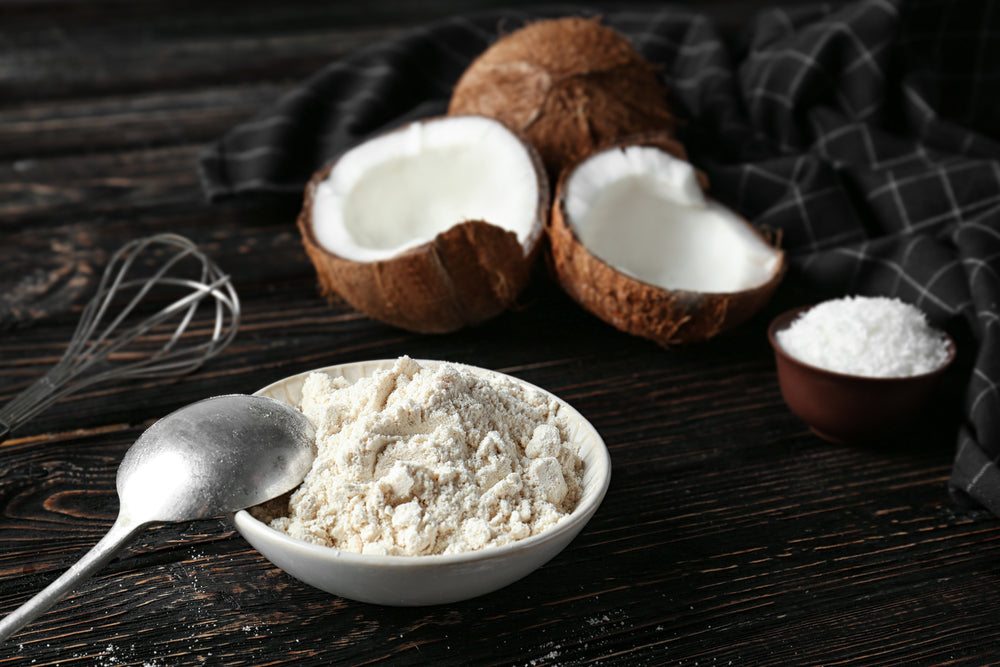Gluten-free and grain-free, coconut flour is one of the best alternative flours in the market.
Perfect for thickening soups, creating a tender crumb on your baked goods, and providing nutritious benefits, this is one flour you’ll want to add to your pantry.
Choosing the Best Coconut Flour
This product is the new “it” superfood hype, but before rushing to the store, know that not all coconut flour are made equal, like many foods nowadays.
It’s best to choose a raw and organic coconut flour since it retains all the live enzymes and other nutrients like protein, fiber, and omega-3s — things that the more processed types may not have.
Products that aren’t 100 percent raw are bleached and deodorized, which you could easily tell from their brighter white color. Raw coconut flour has an almost beige tint and a much richer scent than highly processed coconut flour.
Products that aren’t organic could be sprayed with pesticides and could be genetically modified. Getting anything other than raw and organic would defeat the purpose of switching to a healthier flour alternative.
Also, make sure to refrigerate your coconut flour to preserve its natural nutrients and to prevent it from spoiling.
Why Coconut Flour Is a Smart Switch
Protein
Your body uses protein to make enzymes, hormones, and other chemicals that make it an important building block for your bones, muscles, cartilage, skin, and blood. Protein is also used to build and repair tissues, so it’s no wonder health experts rave about foods high in protein. Just a ¼ cup of coconut flour yields 7 grams of protein for only 120 calories.
Antimicrobial
Coconut is a well-known antiviral agent, thanks to the lauric caprylic acids, both of which have been linked to improving immune health and warding off harmful bacteria, fungi, yeasts, and viruses.

Great Replacement For Grain
Grains are typically healthy, with whole grains providing key B vitamins, fiber, and protein. However, some people just don’t digest them well. Coconut flour lends more fiber per two tablespoons than any 1/2 cup serving of grains, more protein, and many of the same B vitamins, along with potassium and magnesium.
Good For The Brain and Body
Coconut flour retains the beneficial medium chain triglyceride fats that the whole coconut contains.
These fats, also known as MCT fats, are well-absorbed and easily processed by the liver where they’re used for energy and metabolism instead of for fat storage. MCT fats and coconut have been linked to better brain health, including improved mood, memory, and focus. Coconut, unlike butter, is also cholesterol-free, despite containing saturated fats.
Beneficial For Blood Sugar
Because coconut is rich in fiber and protein, it’s incredible for balancing blood sugar levels. For each ¼ cup, you’ll receive 12 grams of fiber, 7 grams of protein, only 3 grams of fat, and 120 calories. Those numbers are hard to beat.
Protein and fiber are beneficial for blood sugar levels because they slow down the release of sugars into the bloodstream. Coconut flour is also very low in sugar and carbohydrates compared to most all grain-based flours and all other grain-free alternative flours.
How To Use Coconut Flour

Like replacing butter with coconut oil, coconut flour can replace your regular white flour in multiple ways:
- Stir in about 2 tablespoons of coconut flour to thicken your oatmeal.
- Add ¼ cup to your smoothies as an extra source of protein or to create a thicker texture.
- Stir into your hot soups to thicken.
- Bake your baked goods with coconut flour and coconut oil instead of using white flour and butter.
- Make an instant pudding using coconut flour, milk, vanilla extract, chia seeds, and yogurt.
Things To Know About Baking With Coconut Flour
Coconut flour is a great thickener due to its high protein and fiber content. But make sure you don’t use too much in your baking. You only need half the amount of coconut flour you would of regular flour. But you need double the amount of egg substitute. Adding a bit of baking soda will also help with rising.
Coconut flour absorbs a lot more liquid than other gluten-free flours, so you’ll need to double the amount of liquid in order for your recipe to work correctly.
Make sure to sift your coconut flour since it’s so dense.
Now that you pretty much know everything you need to know about coconut flour, tell us what you’re going to cook or bake with it!

 Log in
Log in
